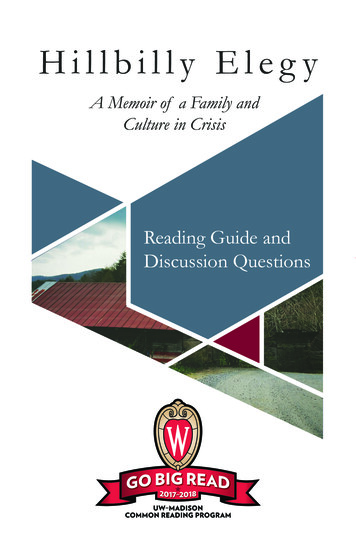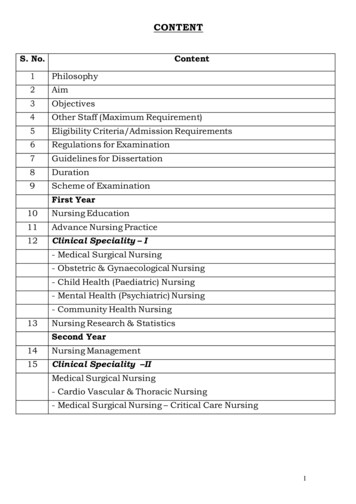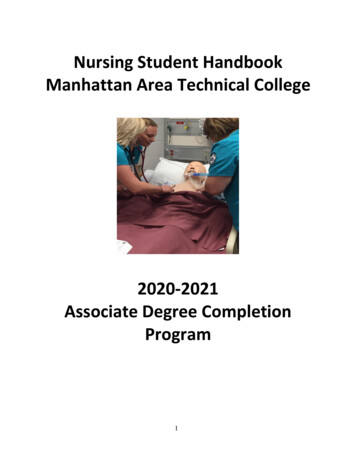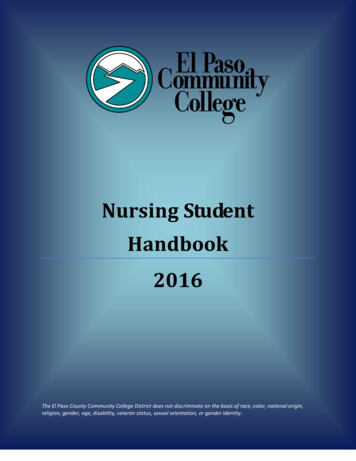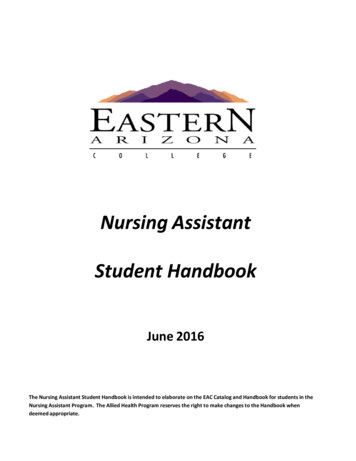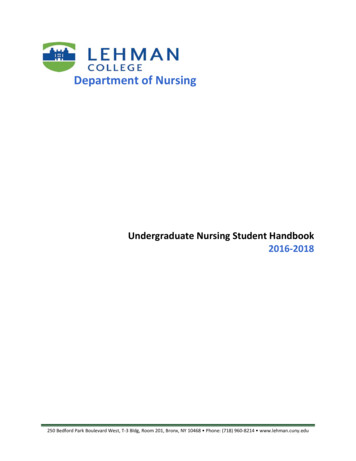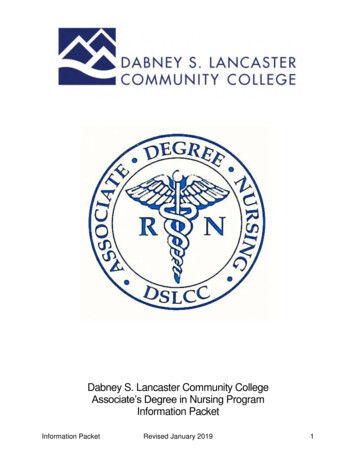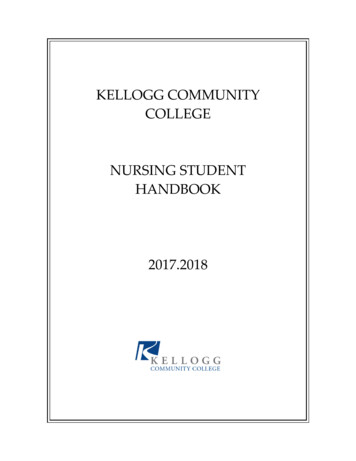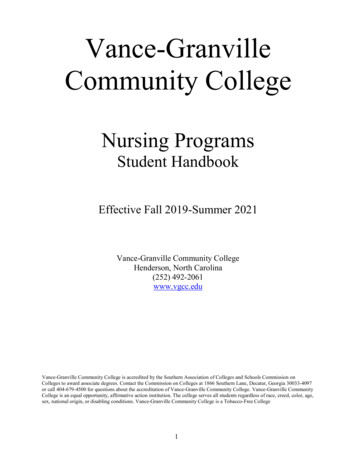
Transcription
Vance-GranvilleCommunity CollegeNursing ProgramsStudent HandbookEffective Fall 2019-Summer 2021Vance-Granville Community CollegeHenderson, North Carolina(252) 492-2061www.vgcc.eduVance-Granville Community College is accredited by the Southern Association of Colleges and Schools Commission onColleges to award associate degrees. Contact the Commission on Colleges at 1866 Southern Lane, Decatur, Georgia 30033-4097or call 404-679-4500 for questions about the accreditation of Vance-Granville Community College. Vance-Granville CommunityCollege is an equal opportunity, affirmative action institution. The college serves all students regardless of race, creed, color, age,sex, national origin, or disabling conditions. Vance-Granville Community College is a Tobacco-Free College1
VANCE-GRANVILLE COMMUNITY COLLEGENURSING PROGRAMSSTUDENT HANDBOOK 2019-2021ContentsSection I: . 4VGCC Nursing Programs . 4COLLEGE MISSION STATEMENT . 5COLLEGE VISION STATEMENT . 5HISTORY OF THE NURSING PROGRAMS. 5ASSOCIATE DEGREE NURSING PROGRAM (A45110). 5Course Sequence (Associate Degree Nursing Program) . 10Course Sequence (LPN to ADN Transition Program- Summer Admission) . 11PRACTICAL NURSING PROGRAM (D45660) . 12Course Sequence (Practical Nursing Program). 16REGIONALLY INCREASING BACCALAUREATE NURSING (RIBN) PROGRAM(A10300S/A45110) . 17Course Sequence (RIBN Program) . 18NURSING DEPARTMENT FULL-TIME FACULTY . 20Section II: . 21General Information for Nursing Students . 21ESSENTIAL FUNCTIONS REQUIRED OF A NURSING STUDENT . 22RISK HAZARDS/PHYSICAL JOB DEMANDS OF THE NURSE . 24FACULTY EXPECTATIONS . 25STUDENT RESPONSIBILITIES . 25HEALTH INFORMATION, CRIMINAL BACKGROUND CHECKS AND DRUG SCREENS. 25ESTIMATION OF FEES ASSOCIATED WITH NURSING PROGRAMS. 26ADVISING . 28ATI TESTING . 29CLINICAL ROTATIONS . 30CLINICAL SIMULATION . 34COMMUNICATION DEVICES . 34EMAIL . 35EXAMS. 35EXAM REVIEWS . 36FIELD TRIPS . 36HONOR CODE . 37LEARNING ASSIGNMENTS . 37MEDICATION CALCULATION ASSESSMENT . 38MEDICATION RIGHTS/ERRORS . 42MOODLE . 43NATIONAL STUDENT NURSING ASSOCIATION BYLAWS . 43ORIENTATION . 47PROGRESSION WHILE IN THE NURSING PROGRAMS . 48ROUNDING RULES (MEDICATION CALCULATION ANSWERS) . 492
SAFE NURSING PRACTICE IN CLINICAL . 50SIMLAB . 52SOCIAL MEDIA . 52STUDENT INSURANCE . 53WITHDRAWAL. 53PROGRAM ADMISSIONS/READMISSIONS . 53RE-ENTRY/ADVANCED PLACEMENT/TRANSFER INTO A NURSING PROGRAM . 54RETURNING TO SCHOOL AFTER ILLNESS . 56HONORS . 57NURSING DELEGATE/CLASS BYLAWS/PINNING CEREMONY . 57GRADUATION . 61NCLEX EXAMINATION . 61ADVANCED DEGREES . 61Section III: . 63Nursing Department Regulations . 63ATTENDANCE . 64EXTENUATING CIRCUMSTANCES. 65CHEATING . 66DISMISSAL . 66DRESS CODE . 68EXPOSURE/ACCIDENT/INJURY AT CLINICAL . 70GRADE APPEAL. 70GRADING . 71GRIEVANCE . 72PLAGIARISM . 73PROFESSIONAL BEHAVIOR . 73SUBSTANCE ABUSE . 74TESTING ACCOMMODATIONS . 75TOBACCO FREE . 76STUDENT HANDBOOK FORM . 78HONOR CODE STATEMENT. 78AUTHORIZATION TO RELEASE INFORMATION FORM . 79PHOTOGRAPHY, VIDEOGRAPHY & QUOTE RELEASE FORM . 80NURSING ADVISOR FORM. 81AUTHORIZATION FOR REFERENCE FORM . 82NURSING DEPARTMENT DELEGATE/CLASS/CLUB OFFICER APPROVAL FORM . 83NOTE TO RETRUN TO SCHOOL AFTER ILLNESS. 843
Section I:VGCC Nursing Programs4
COLLEGE MISSION STATEMENTVance-Granville Community College educates, inspires, and supports a diverse community of learners toachieve professional and personal success.COLLEGE VISION STATEMENTIn partnership with our community, Vance-Granville Community College will lead the economicdevelopment of our region, be nationally-recognized for educational excellence, and improve ourworld through stewardship and sustainability.HISTORY OF THE NURSING PROGRAMSThe Nursing Program at Vance-Granville Community College was originally established in 1971as a practical nurse program. In 1983, the expansion of the program saw the beginning of theAssociate Degree program. In 1998, a practical nursing program was re-established as astandalone program. In 2010, the LPN to ADN Transition Program accepted its first studentswho graduated in May of 2011. The RIBN Program with NC A&T State University began inFall of 2016.ASSOCIATE DEGREE NURSING PROGRAM (A45110)Curriculum DescriptionThe Associate Degree Nursing curriculum provides knowledge, skills, and strategies to integratesafety and quality into nursing care, to practice in a dynamic environment, and to meet individualneeds which impact health, quality of life, and achievement of potential.Course work includes and builds upon the domains of healthcare, nursing practice, and theholistic individual. Content emphasizes the nurse as a member of the interdisciplinary teamproviding safe, individualized care while employing evidence-based practice, qualityimprovement, and informatics.Graduates of this program are eligible to apply to take the National Council LicensureExamination (NCLEX-RN). Employment opportunities are vast within the global health caresystem and may include positions within acute, chronic, extended, industrial, and communityhealth care facilities.Mission StatementThe Associate Degree Nursing program supports the mission of the North Carolina CommunityCollege System and the mission of Vance-Granville Community College. The faculty iscommitted to providing accessible high quality nursing education to meet the diverse andchanging healthcare needs of the service area and to promoting the development of qualifiedstudents prepared for the professional role of registered nurse at the entry level.5
PhilosophyThe philosophy of the Associate Degree Nursing (ADN) Program is derived from statementsabout health, quality of life, achievement of potential, the individual, environment, healthcare,and nursing. The goal of nursing faculty is to promote the highest quality of nursing care to theindividual through ADN education. The aim is to facilitate health, quality of life, andachievement of potential for the individual.The graduate of the Associate Degree Nursing program of Vance-Granville Community Collegeis prepared to meet the educational competencies defined by the National League for Nursingand the Nursing Practice Act of North Carolina. The practice of nursing is directed towardmeeting the health care needs of individuals throughout their life spans The Associate Degreeprepared nurse’s role is characterized by evidence-based clinical practice with the provision ofcare for individuals in structured settings. The ADN graduate demonstrates the competenciesidentified by the National League for Nursing (2010) and the Institute of Medicine (2003) toprovide nursing care.The National League for Nursing (National League for Nursing, Competencies for Graduates ofAssociate Degree and Diploma petencies/comp ad dp.htm Retrieved April 18,2011) identifies these competencies as:1. Human Flourishing: Advocating for patients and families in ways that promote their selfdetermination, integrity, and ongoing growth as human beings.2. Nursing Judgment: Making judgments in practice, substantiated with evidence, thatintegrate nursing science in the provision of safe, quality care and that promote the healthof patients within a family and community context.3. Professional Identity: implementing one’s role as a nurse in ways that reflect integrity,responsibility, ethical practices, and an evolving identity as a nurse committed toevidence-based practice, caring, advocacy, and safe, quality care for diverse patientswithin a family and community context.4. Spirit of Inquiry: examining the evidence that underlies clinical nursing practice tochallenge the status quo, question underlying assumptions, and offer new insights toimprove the quality of care for patients, families, and communities.According to the Institute of Medicine (2003), nurse graduates should be able to:1. Provide patient-centered care2. Work in interdisciplinary teams3. Employ evidence-based practice4. Apply quality improvement and5. Utilize informaticsAssociate Degree Nurse EducationNursing education at the Associate Degree level is a process that facilitates changes in behavior,the acquisition of knowledge, skills, and attitudes necessary to function in the role of the entrylevel registered nurse. The curriculum, as adopted by the North Carolina Community CollegeSystem, is conceptually based and founded on principles of adult and collaborative learning.Basic assumptions include self-direction, utilizing adult experience, and problem and activity-6
centered learning. The curriculum incorporates evidence-based nursing theory and practice,general education, and the sciences in an environment conducive to learning.Learning is a continuous process that results in a change of behavior and occurs when the studentis challenged and motivated to enhance personal knowledge. Teaching and learning are aninteractive process between teacher and learner. Learning is about making connections andoccurs from simple to complex. The responsibility of the faculty of Vance-GranvilleCommunity College Associate Degree Nursing Program is to facilitate the student’sunderstanding and ability to meet the competencies for nursing practice through the design andevaluation of learning experiences. The nursing student is responsible for actively participatingin learning experiences and developing the knowledge, skills, and attitudes necessary to providequality individual centered nursing care. At the completion of the curriculum, the student willpractice nursing within the healthcare system to help the individual achieve the outcomes ofquality of life, achievement of potential, and health.Conceptual FrameworkThe domains of the individual, healthcare, and nursing provide the conceptual framework thatguides the Associate Degree Nursing curriculum. Concepts are organized within each of thesedomains. The student must attain mastery of each domain in order to successfully complete thecurriculum.A modified systems theory based on Betty Neuman’s model is used as the organizing frameworkfor the development and implementation of the nursing curriculum. The model provides anunderstanding of basic nursing concepts: the client-individual, the environment, health andnursing (Neuman & Fawcett, 2002).DefinitionsIndividualThe individual is a complex, multidimensional, unique, and significant being whopossesses inherent value and worth. The individual is a member of a family, acommunity, and a culturally diverse society. All individuals have interdependent,dynamic physiological (biophysical), psychological, socio-cultural (social functioning),spiritual, and developmental variables that contribute to health, quality of life, andachievement of potential. Changes in any of the five variables may affect the individualthroughout his/her lifespan. In order to provide and manage care, nurses must view theindividual as the center of any nursing activity.EnvironmentThe individual constantly interacts with and is affected by the environment. Environmentis defined as “all internal and external factors or influences surrounding the client[individual]” (Neuman & Fawcett, 2002, p. 18). Changes in the environment may affectthe individual throughout his/her lifespan. The nurse may assist the individual to alteraspects of the environment or to utilize coping mechanisms to adapt to these changes.7
HealthHealth is a dynamic state of well-being where there is stability and optimal functionwithin and among the five variables and the environment throughout all stages of lifefrom birth to death. Optimal function refers to the best possible health state at a givenpoint in time. The individual is healthy when he/she is able to maintain stability andoptimal function even when there are changes in the five variables and/or theenvironment. Illness is defined as instability in the system or less than optimal function.Each individual’s health is based on his/her cultural perceptions and beliefs of health andillness. The nurse may assist the individual in preventing illness, promoting and restoringhealth, and achieving a dignified death.NursingNursing is a dynamic practice profession, ever-evolving and reshaping itself in responseto influences of continuous quality improvement, public regulation and technological,societal and economic changes (Watts School of Nursing, 2006). Nursing is a scienceand an art involving the unique application of evidence-based knowledge and skillswithin the context of a professional, caring relationship to improve individual outcomes.The role of the nurse is to utilize the nursing process in collaboration with the individualand the interdisciplinary health care team to provide care to the individual. The nursingprocess includes assessment, diagnosis, planning, implementation, and evaluation.Nursing care is focused on individual-centered interventions to achieve health throughprimary, secondary and tertiary prevention strategies (Neuman & Fawcett, 2002).Quality of LifeQuality of life is defined as an individual’s satisfaction with his or her life and generalsense of well-being. It is affected by the five variables including physiological,psychological, socio-cultural, spiritual, and developmental. The nurse may assist theindividual in promoting quality of life.Achievement of PotentialAchievement of potential is the individual’s growth toward attaining one’s optimalfunction and quality of life. It is affected by the individual’s choices, perceptions,personal goals, life experiences, and holistic health. The nurse may assist the individualin achieving his/her potential.Program Objectives1. Practice professional nursing behaviors incorporating personal responsibility andaccountability for continued competence.2. Communicate professionally and effectively with individuals, significant supportperson(s), and members of the interdisciplinary healthcare team.3. Integrate knowledge of the holistic needs of the individual to provide an individualcentered assessment.4. Incorporate informatics to formulate evidence-based clinical judgments and managementdecisions.5. Implement caring interventions incorporating documented best practices for individualsin diverse settings.8
6. Develop a teaching plan for individuals, and/or the nursing team, incorporating teachingand learning principles.7. Collaborate with the interdisciplinary healthcare team to advocate for positive individualand organizational outcomes.8. Manage health care for the individual using cost effective nursing strategies, qualityimprovement processes, and current technologies.ReferencesInstitute of Medicine. (IOM). (2003). Health professions education: A bridge to quality.Washington, DC: The National Academics PressNational League for Nursing, Competencies for Graduates of Associate Degree and DiplomaPrograms. /comp ad dp.htm RetrievedApril 18, 2011.Neuman, B., & Fawcett, J. (2002). The Neuman systems model (4thed.). New Jersey: PrenticeHall.Watts School of Nursing. (2006). Watts school of nursing student catalog. Durham, NC: WattsSchool of NursingRevised: May 20119
Course Sequence (Associate Degree Nursing Program)Course No.Course TitleLectureLabFIRST SEMESTER - FALLNUR 111Intro to Health ConceptsBIO 168/165 Anatomy & Physiology IENG 111*Writing & Inquiry433630600843SECOND SEMESTER - SPRINGNUR 112Health-Illness ConceptsNUR 113Family Health ConceptsBIO 169/166 Anatomy & Physiology II333003660554THIRD SEMESTER - SUMMERNUR 212Health Systems ConceptsBIO 271PathophysiologyENG 112*Writing/Research in the DiscPSY 150*General Psychology3333000060005333FOURTH SEMESTER - FALLNUR 114Holistic Health Concepts3NUR 211Health Care Concepts3PSY 241Developmental Psychology 300066055330150103FIFTH SEMESTER - SPRINGNUR 213Complex Health ConceptsHUM/FA** (HUM 115, ART111*,ART 114*, ART 115*, MUS 110*,MUS 112*, PHI 215*, PHI 240*)43ClinicalTOTAL CREDIT HOURS:Credit69*Course is a UGETC (Universal General Education Transfer Component) Course per theComprehensive Articulation Agreement effective Fall 2014.** HUM/FA courses not listed may be approved via course substitution, however, students areadvised that the course substituted may not be accepted for the RN to BSN Uniform ArticulationAgreement effective Fall 2015.Note: Students must complete all courses listed in each semester together unless relatedcourses have been previously completed with a “C” or better. Nursing courses are onlyoffered in the semester listed.Course descriptions and the VGCC Academic calendar can be found on the VGCCwebsite.Revised: February 201710
Course Sequence (LPN to ADN Transition Program- Summer Admission)Course No.Course TitleLectureLabTO BE COMPLETED PRIOR TO PROGRAM ADMISSIONBIO 168/165 Anatomy & Physiology I33ENG 111*Writing & Inquiry30PSY 150*General Psychology30Clinical000Credit433Upon admission to the LPN to ADN Transition Program, the student will be awarded transfercredit for NUR 101 and NUR 102 for a total of 21 credit hoursFIRST SEMESTER - SUMMERNUR 214Nursing Transition ConceptsBIO 169/166 Anatomy & Physiology IIENG 112*Writing/Research in the DiscPSY 241Developmental Psychology3333030030004433SECOND SEMESTER – FALLNUR 114Holistic Health ConceptsNUR 211Health Care ConceptsBIO 271Pathophysiology3330006605534330150103THIRD SEMESTER - SPRINGNUR 213Complex Health ConceptsHUM/FA** (HUM 115, ART111*,ART 114*, ART 115*, MUS 110*,MUS 112*, PHI 215*, PHI 240*)TOTAL CREDIT HOURS:69*Course is a UGETC (Universal General Education Transfer Component) Course per theComprehensive Articulation Agreement effective Fall 2014.** HUM/FA courses not listed may be approved via course substitution, however, students areadvised that the course substituted may not be accepted for the RN to BSN Uniform ArticulationAgreement effective Fall 2015.Note: Students must complete all courses listed in each semester together unless relatedcourses have been previously completed with a “C” or better. Nursing courses are onlyoffered in the semester listed.Course descriptions and the VGCC Academic calendar can be found on the VGCCwebsite.Revised: February 201711
PRACTICAL NURSING PROGRAM (D45660)Curriculum DescriptionThe Practical Nursing curriculum prepares individuals with the knowledge and skills to providenursing care to meet the health care needs of the individual throughout their lifespan. The role ofthe LPN is a dependent role under the supervision of the registered nurse (RN) and otherhealthcare providers approved by North Carolina law. In accordance with the North CarolinaBoard of Nursing Administrative Code, 21NCAC 36.0225, Components of Nursing Practice forthe Licensed Practical Nurse (LPN), the LPN accepts assignments that can be safely performedand participates in assessing, planning, implementing, and evaluating the client’s response tohealthcare interventions. Graduates are eligible to apply to take the National Council LicensureExamination (NCLEX-PN) which is required for practice as a Licensed Practical Nurse.Employment opportunities include hospitals, rehabilitation/long term care/home health facilities,clinics, and physicians’ offices.Mission StatementThe nursing faculty of Vance-Granville Community College, in support of the philosophy,purpose and objectives of the College, believes that it is the purpose of the Practical Nursingprogram to produce advanced beginning practitioners (Benner, 2001, p. 22) for entry levelpractice in the practical nurse role.For the practical nurse, the faculty has adapted applicable NLN core competencies. These corecompetencies (National League for Nursing, Competencies for Graduates of Practical/VocationalPrograms. /comp prac voc.htmRetrieved April 20, 2011) are:1. Human Flourishing: promoting the human dignity, integrity, self-determination, andpersonal growth of patients, oneself, and members of the health care team.2. Nursing Judgment: providing a rationale for judgments used in the provision of safe,quality care and for decisions that promote the health of patients within a family context.3. Professional Identity: assessing how one’s personal strengths and values affect one’sidentity as a nurse and one’s contributions as a member of the health care team.4. Spirit of Inquiry: questioning the basis for nursing actions, considering research,evidence, tradition, and patient preferences.The faculty believes that within these core competencies, those recommended by the Institute ofMedicine in “Health Professions Education,” i.e. patient-centered care, work in interdisciplinaryteams, employment of evidence-based practice, application of quality improvement, andutilization of informatics, are included (IOM, 2003, p. 45).A modified systems theory based on Betty Neuman’s model is used as the organizing frameworkfor the development and implementation of the nursing curriculum. The model provides anunderstanding of basic nursing concepts: the client, the environment, health and nursing(Neuman & Fawcett, 2002, p. 4). The domains of the individual, the healthcare system, andnursing guide the nursing curriculum. Concepts and exemplars are organized within each ofthese domains and learning occurs from simple to complex.12
The client, or recipient of nursing care, is an open system, composed of five interacting,interdependent and ever changing variables: physiological, psychological, developmental, sociocultural and spiritual. The client can be an individual, family, group, or community. The clientconstantly interacts with and is affected by the environment. Any changes in any of the fivevariables and/or the environment affect the total system. These changes occur throughout theclient’s development.Environment is defined as “all internal and external factors or influences surrounding the client.”The internal environment is “all forces or interactive influences internal to or contained solelywithin the boundaries of the defined client.” Examples include a conditioned response or anautoimmune response. The external environment is “all forces or interactive influences externalto or existing outside the defined client.” Examples include role expectations andcommunication patterns (Neuman & Fawcett, 2002, p. 18).Health is a dynamic state of well-being where there is stability and optimal function within andamong the five client variables and the environment throughout all stages of life from birth todeath. Optimal function refers to the best possible health state at a given point in time. Theclient is healthy when he is able to maintain stability and optimal function even when there arechanges in the five variables/and or the environment. Disease is just one type of change. Illnessis defined as instability in the system or less than optimal function. Health and illness aresocially and individually defined con
Vance -Granville Community College is a Tobacco-Free College . 2 VANCE-GRANVILLE COMMUNITY COLLEGE NURSING PROGRAMS . STUDENT HANDBOOK 2019-2021 . Contents Section I: . HEALTH INFORMATION, CRI

